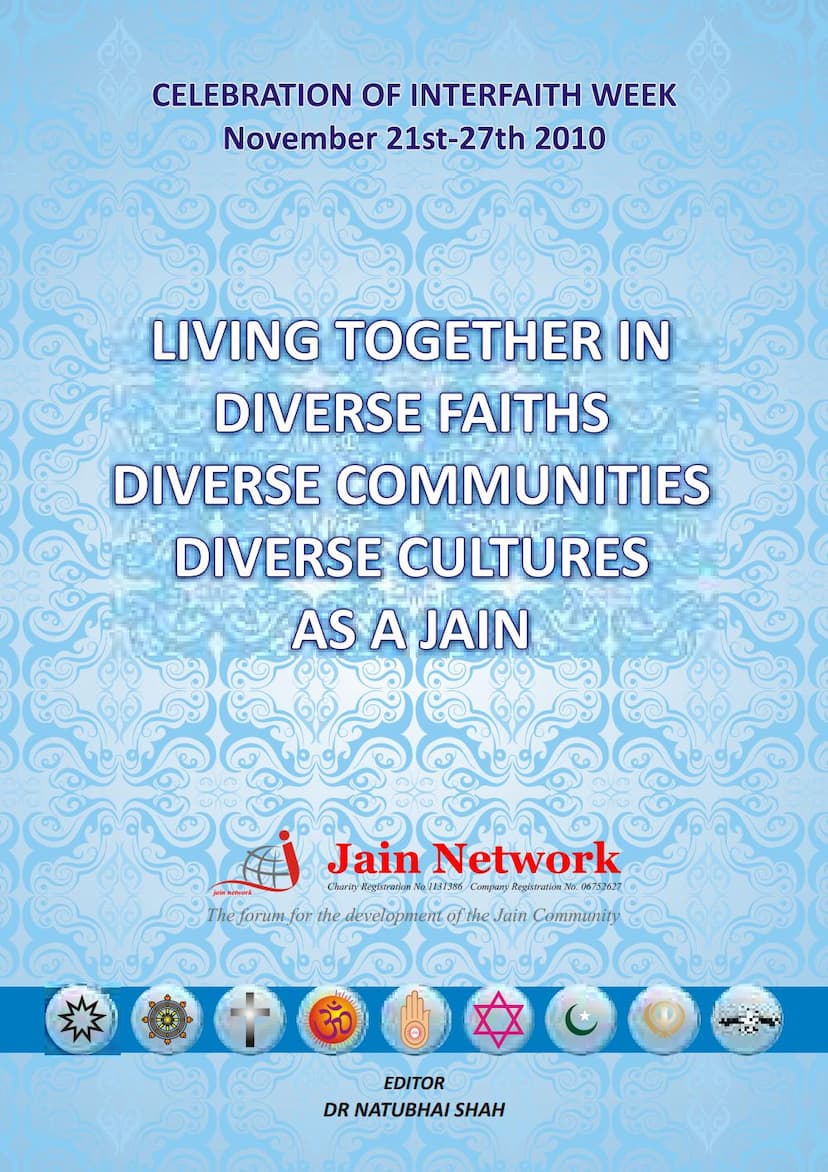Jain Network 2010 11
Added to library: September 2, 2025

Summary
Here's a comprehensive summary of the provided Jain text, "Jain Network 2010 11," focusing on its content and the information it conveys:
Overall Purpose and Context:
The document, published by the UK Jain Network, serves as a publication for the Jain community and coincides with Interfaith Week 2010 (November 21st-27th). Its primary aim is to highlight the principles and contributions of Jainism within the multicultural and multifaith landscape of Britain, emphasizing the importance of interfaith dialogue and coexistence.
Key Themes and Sections:
-
Britain's Diverse Society:
- The introduction paints a picture of the UK as a diverse, multicultural, and multifaith nation. It notes the significant changes in British society since the 19th century, including increased ethnic diversity and a decline in religious observance, while acknowledging the continued influence of Christianity.
- It highlights the government's recognition of the value of faith communities and the development of race relations and equality policies based on multiculturalism.
-
Diverse Faiths in Britain:
- The document provides concise summaries of nine major faiths active in Britain: Baha'i, Buddhism, Christianity, Hinduism, Islam, Jainism, Judaism, Sikhism, and Zoroastrianism.
- Each summary outlines the faith's founder, global and UK population estimates (where available), core beliefs, key practices, and approach to interfaith relations.
- Jainism's specific section (Page 8-9, 11-14) details:
- Its origin from the term "Jina" (victor over passions).
- The cyclical nature of time and the role of Tirthankaras, with a focus on Mahavira as the 24th Tirthankara and a key figure in modern Jainism.
- Mahavira's emphasis on non-violence (Ahimsa) and pluralism (Anekantavada) as guiding principles.
- The "Three Jewels": Right Faith, Right Knowledge, and Right Conduct.
- The five core vows: Ahimsa, Satya (truthfulness), Asteya (non-stealing), Brahmacharya (celibacy/chastity), and Aparigraha (non-attachment).
- The estimated Jain population in the UK (around 30,000).
- The distinction between Shvetambara and Digambara traditions and the challenges faced by Jains in the UK due to the absence of resident ascetics.
- The importance of community organizations and the aspiration for dedicated places of worship.
- Jain values such as self-effort, equality, tolerance, philanthropy, and care for the natural world.
-
Interfaith Dialogue and Cohesion:
- The document strongly advocates for interfaith dialogue and collaboration as essential for a peaceful and progressive society.
- It emphasizes common values shared across faiths, such as non-violence, truthfulness, honesty, care for nature, and mutual help.
- It references the government's "Face to Face and Side by Side" framework, promoting dialogue for understanding and collaborative social action for positive change.
- The importance of interfaith organizations like the Interfaith Network of the UK is highlighted.
-
Jain Community in the UK:
- It describes the migration patterns of Jains to the UK, primarily from India and East African countries.
- It notes their settlement in various cities and their strong presence in business, finance, and professions like accountancy, medicine, and pharmacy.
- The establishment of numerous Jain organizations and temples across the UK is mentioned.
- Challenges and Needs:
- Awareness: Acknowledges a lack of public awareness about Jainism, leading to confusion with Hinduism. The need for greater awareness in schools and public institutions is stressed.
- Spiritual Leadership: The absence of resident Jain monks and nuns in the UK creates a need for better spiritual guidance.
- Infrastructure and Training: The community requires administrative and training support similar to established faiths to preserve its heritage.
- Education: The need for resources and trained teachers for Jain heritage education, including Sunday schools and outreach to public schools, is identified.
- Skills Development: Jains need training for employment, public services, and participation in civil society.
-
Interfaith Week 2010 Events:
- The document details the Jain Network's participation in Interfaith Week 2010, including an Interfaith Day at the Jain Centre in London on November 21st, 2010.
- The theme was "Jain contribution in the Public Life," with sessions focusing on "Ahimsa" (Respect for Life) and "Anekantavada" (Meaningful Multifaith engagement).
- Key events included a launch of an Interfaith Book on Marriage ("Reflections and Understandings Nine Faiths in Britain"), workshops, and panel discussions involving representatives from various faiths.
-
Jain Values and Mission:
- Reiterates the Jain belief in spiritual liberation through Right Faith, Right Knowledge, and Right Conduct.
- Emphasizes Mahavira's teachings on equality, pluralism, equanimity, simplicity, and obedience to law.
- Highlights the Jain commitment to non-violence, truthfulness, honesty, non-attachment, and austerity.
- The Jain community's contribution to civil society is framed through their principles of non-violence, acceptance of multiple views, equality, and resilience. Their motto is "live and help to live."
- The mission of the Jain Network is stated as the development of the Jain community, promotion of Jain values, and increased Jain awareness in wider communities.
In essence, the "Jain Network 2010 11" publication is a proactive effort by the UK Jain community to engage with the broader British society during Interfaith Week. It serves as an educational tool to introduce Jainism, articulate its core values, and demonstrate its commitment to peaceful coexistence and mutual understanding within a diverse nation. It also candidly addresses the challenges and aspirations of the Jain community in the UK, seeking to foster greater awareness and support for their heritage and integration.